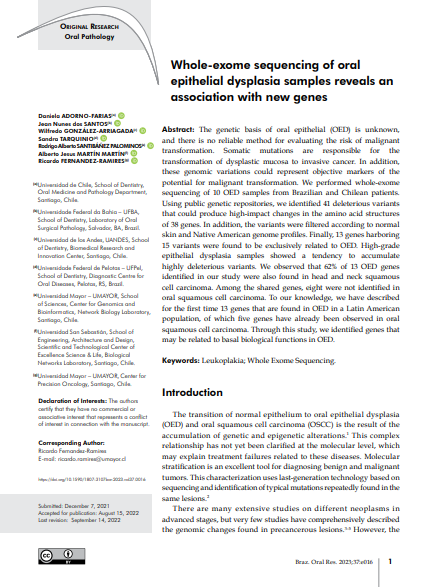Whole-exome sequencing of oral epithelial dysplasia samples reveals an association with new genes

Fecha
2023-03-23Autor
Adorno-Farias, Daniela
Nunes dos Santos, Jean
González-Arriagada, Wilfredo
Tarquinio, Sandra
Santibáñez Palominos, Rodrigo Alberto [Univ Mayor UMAYOR, Ctr Genom & Bioinformat, Sch Sci, Network Biol Lab, Santiago, Chile]
Martin Martin, Alberto Jesús
Fernández-Ramires, Ricardo
Ubicación geográfica
Notas
HERRAMIENTAS
Acceda a títulos restringidos
¿Cómo descargar?Resumen
The genetic basis of oral epithelial (OED) is unknown, and there is no reliable method for evaluating the risk of malignant transformation. Somatic mutations are responsible for the transformation of dysplastic mucosa to invasive cancer. In addition, these genomic variations could represent objective markers of the potential for malignant transformation. We performed whole-exome sequencing of 10 OED samples from Brazilian and Chilean patients. Using public genetic repositories, we identified 41 deleterious variants that could produce high-impact changes in the amino acid structures of 38 genes. In addition, the variants were filtered according to normal skin and Native American genome profiles. Finally, 13 genes harboring 15 variants were found to be exclusively related to OED. High-grade epithelial dysplasia samples showed a tendency to accumulate highly deleterious variants. We observed that 62% of 13 OED genes identified in our study were also found in head and neck squamous cell carcinoma. Among the shared genes, eight were not identified in oral squamous cell carcinoma. To our knowledge, we have described for the first time 13 genes that are found in OED in a Latin American population, of which five genes have already been observed in oral squamous cell carcinoma. Through this study, we identified genes that may be related to basal biological functions in OED.
URI
https://repositorio.umayor.cl/xmlui/handle/sibum/9494https://www.scielo.br/j/bor/a/tFbmkHHRG5CycFGttBr9wYr/?format=pdf&lang=en
https://doi.org/10.1590/1807-3107bor-2023.vol37.0016
Coleccion/es a la/s que pertenece:
Si usted es autor(a) de este documento y NO desea que su publicación tenga acceso público en este repositorio, por favor complete el formulario aquí.